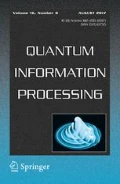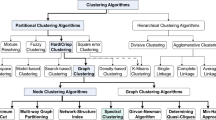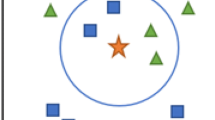Abstract
Clustering algorithms are used to classify the unlabeled data into a number of categories with polynomial time complexity. Quantum clustering algorithms are developed to improve the performance and to achieve higher gain. In this work, we implement the quantum k-means clustering algorithm on field-programmable gate array (FPGA) by exploiting the implicit parallelism of the FPGA technology to achieve high speed among the software-implemented recent proposals. To do that, we establish a new method to measure the inner product between two qubits which is based on the correlation between the Euclidean distance and the inner product. We also optimize the quantum gates in terms of speed and removing the discretization error. Experimental results show a reduction in the running time by 500× as compared to the classical k-means algorithm for the A1 standard dataset.















Similar content being viewed by others
References
Ester, M., Kriegel, H.P., Sander, J., Xu, X.: A density-based algorithm for discovering clusters a density-based algorithm for discovering clusters in large spatial databases with noise. In: Proceedings of the Second International Conference on Knowledge Discovery and Data Mining (KDD’96), Evangelos Simoudis, Jiawei Han, and Usama Fayyad (Eds.). AAAI Press, pp. 226–231 (1996)
Chen, J., Zhang, L., Liang, Y.: Full-duplex transceiver design: a GMM clustering approach. In: 2018 IEEE International Conference on Communication Systems (ICCS), Chengdu, China, 2018, pp. 433–438. https://doi.org/10.1109/iccs.2018.8689230
Pakhira, M.K.: A linear time-complexity k-means algorithm using cluster shifting. In: 2014 International Conference on Computational Intelligence and Communication Networks, Bhopal, pp. 1047–1051 (2014)
Bifet, A.: Machine Learning for Data Streams, Chapter 9. MIT Press, Cambridge (2018)
Oshurko, I.: Quantum Machine Learning. Quantum Information and Computation Course (2016). https://pdfs.semanticscholar.org/776b/5c7b2966fd700980361aa32ee573edb70bf3.pdf
Benioff, P.: Quantum mechanical Hamiltonian models of Turing machines. J. Stat. Phys. 29, 515–546 (1982). https://doi.org/10.1007/BF01342185
Shor, P.W.: Polynomial-time algorithms for prime factorization and discrete logarithms on a quantum computer. SIAM J. Comput. 26(5), 1484–1509 (1997)
Mahmud, N., El-Araby, E., Caliga, D.: Scaling reconfigurable emulation of quantum algorithms at high precision and high throughput. Quantum Eng 1(2), e19 (2019)
Xin, T.: A novel approach for emulating quantum computers on classical platforms. Quantum Eng 1(2), e18 (2019)
Vedral, V., Barenco, A., Ekert, A.: Quantum networks for elementary arithmetic operations. Phys. Rev. A 54(1), 147 (1996)
Van Meter, R., Itoh, K.M.: Fast quantum modular exponentiation. Phys. Rev. A 71(5), 052320 (2005)
Pilch, J., Długopolski, J.: An FPGA-based real quantum computer emulator. J. Comput. Electron. 18(1), 329–342 (2019)
Lee, Y.H., Khalil-Hani, M., Marsono, M.N.: An FPGA-based quantum computing emulation framework based on serial-parallel architecture. Int. J. Reconfig. Comput. 2016, 5718124, 18 pages (2016)
Hu, F., Wang, B.N., Wang, N., et al.: Quantum machine learning with D-wave quantum computer. Quantum Eng. 1(2), e12 (2019)
Britt, B.C.: Modeling viral diffusion using quantum computational network simulation. Quantum Eng. 2(1), e29 (2020)
Wang, S.H., Long, G.L.: Big data and quantum computation. Chin. Sci. Bull. 60(5–6), 499–508 (2015)
Coughlin, T: 175 zetabytes by 2025. Forbes (2018). https://www.forbes.com/sites/tomcoughlin/2018/11/27/175-zettabytes-by-2025/#283740d54597
Aïmeur, E., Brassard, G., Gambs, S.: Quantum clustering algorithms. In: Proceedings of the 24th International Conference on Machine Learning, pp. 1–8 (2007). http://dx.doi.org/10.1145/1273496.1273497
Grover, L.K.: A fast quantum mechanical algorithm for database search. In: Proceedings of the Twenty-Eighth Annual ACM Symposium on Theory of Computing, pp. 212–219 (1996)
Long, G.L.: Grover algorithm with zero theoretical failure rate. Phys. Rev. A 64(2), 022307 (2001)
Tsai, C., Liao, Y., Chiang, M.: A quantum-inspired evolutionary clustering algorithm. In: 2013 International Conference on Fuzzy Theory and Its Applications (iFUZZY), Taipei, 2013, pp. 305–310. https://doi.org/10.1109/ifuzzy.2013.6825455
Han, K.-H., Kim, J.-H.: A quantum-inspired evolutionary algorithm for a class of combinatorial optimization. Trans. Evol. Comput. 6, 580–593 (2002). https://doi.org/10.1109/TEVC.2002.804320
Khalid, A.U., Zilic, Z., Radecka, K.: FPGA emulation of quantum circuits. In: Proceedings of the IEEE International Conference on Computer Design (ICCD’04). IEEE Computer Society, Washington, DC, USA, pp. 310–315 (2004)
MATLAB, 2017. an 9.3 (R2017b), Natick, Massachusetts: The MathWorks Inc
Vivado. 2018.2. The Xilinx, Inc. https://www.xilinx.com/products/design-tools/vivado.html
Zedboard. Xilinx, Inc. https://www.xilinx.com/products/boards-and-kits/1-8dyf-11.html
Fränti, P., Sieranoja, S.: K-means properties on six clustering benchmark datasets. Appl. Intell. 48(12), 4743–4759 (2018). https://doi.org/10.1007/s10489-018-1238-7
Jin, X., Han, J.: K-means clustering. In: Sammut, C., Webb, G.I. (eds.) Encyclopedia of Machine Learning. Springer, Boston (2011)
Arthur, D., Vassilvitskii, S.: K-means++: the advantages of careful seeding. In: 19th SODA (2007), pp. 1027–1035
Malinen, M.I., Mariescu-Istodor, R., Fränti, P.: K-means*: clustering by gradual data transformation. Pattern Recognit. 47, 3376–3386 (2014)
Lai, J.Z., Huang, T.J., Liaw, Y.C.: A fast k-means clustering algorithm using cluster center displacement. Pattern Recognit. 42(11), 2551–2556 (2009)
Author information
Authors and Affiliations
Corresponding author
Additional information
Publisher's Note
Springer Nature remains neutral with regard to jurisdictional claims in published maps and institutional affiliations.
Rights and permissions
About this article
Cite this article
Bonny, T., Haq, A. Emulation of high-performance correlation-based quantum clustering algorithm for two-dimensional data on FPGA. Quantum Inf Process 19, 179 (2020). https://doi.org/10.1007/s11128-020-02683-9
Received:
Accepted:
Published:
DOI: https://doi.org/10.1007/s11128-020-02683-9




